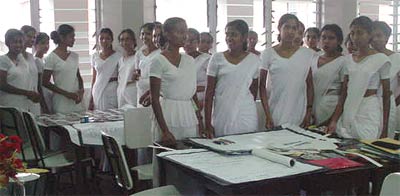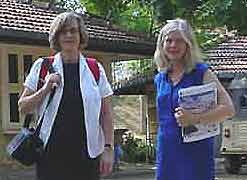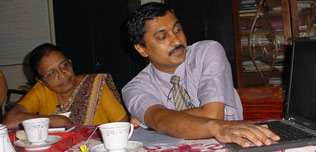SWEDISH SOUTH ASIAN STUDIES NETWORK
School of Health and Society, Kristianstad University College:
Postal address: Sektionen för Hälsa och Samhälle,
Högskolan i Kristianstad, SE-291 88 Kristianstad
Visiting address: Elmetorpsvägen 15
Web page: http://www.hkr.se/templates/Page____6676.aspx
Contact person: Dr. Kerstin Samarasinghe, University lecturer in Nursing, phone: +46 (0)44 20 40 39. Personal web page.

Research and education connected to South Asia:
The department has a long tradition of sending Nursing students on study
tours to Sri Lanka, and has for several years an agreement (through
the Linnaeus-Palme exchange programme) with the Open
University of Sri Lanka.
Kerstin Samarasinghe is in charge of this work, that has resulted
in the signing of an extended MoU (Memorandum of Understanding) between
Kristianstad University and the Open University of Sri Lanka.
The label ”extended” means that exchange activities are open
for all departments in the respective universities.
 |
| Kerstin Samarasinghe (to the right) and Lena Persson, Head of the Department for Health Sciences, Kristianstad University College, on a visit to the National Institute of Health Sciences (NIHS) in Kalutara. |
In the Spring 2004 two students from the Open University studied for 20 weeks at the department in Kristianstad, writing C-level theses. At the same time two Swedish students carried out practical clinical training during 15 weeks in Sri Lanka, and they also followed courses at the Open University.A similar students exchange has taken place during 2007-08, as well as an exchange of teachers: during spring 2007, a lecturer from OU in Colombo gave some lectures in Kristianstad, and in August 2007, Kerstin Samarasinghe was lecturing and supervising at OU in Colombo. The ambition is that the exchange should develop up to Masters level in Health Sciences.
The Nursing programme has also an established cooperation with the Sri Jayawardenepura University in Colombo. (Nursing students from its School of Nursing on the photo above)
The two collaboration projects have received continued funding for the period 2009-10. More information about the South Asia related Linnaeus Palme projects for 2009-10. ![]()
 The Dept.
for Health Sciences also sends students from the Nursing
training programme; the Study Programme in
Health Promotion and Education; and the Programme
for Studies in Social care, to the National
Institute of Health Sciences (NIHS) in Kalutara, Sri Lanka,
for practical clinical training. (The NIHS Director, Dr (Mrs) S.D.
De Silva. and Dr. Sarath Amunugama to be seen on the photo to the left).
The Dept.
for Health Sciences also sends students from the Nursing
training programme; the Study Programme in
Health Promotion and Education; and the Programme
for Studies in Social care, to the National
Institute of Health Sciences (NIHS) in Kalutara, Sri Lanka,
for practical clinical training. (The NIHS Director, Dr (Mrs) S.D.
De Silva. and Dr. Sarath Amunugama to be seen on the photo to the left).
Dr. Kerstin Samarasinghe has a strong personal connection to Sri Lanka, and has previously lived there for 13 years with her family. Read an article about her, written by Lisa Nordenhem (in Swedish).
On 30 March 2007, Kerstin Samarasinghe defended her doctoral dissertation titled ”Facilitating a healthy transition for involuntary migrant families within Primary Health Care” at the Dept. of Nursing, Lund University. It deals with refugee families in Sweden, that face a complex transition due to the nature of the migration. This exposes them to vulnerability in cohesion and family function. Primary Health Care Nurses (PHCN) and Interpreters in Primary Health Care (PHC) play a vital role in their promotion of health because migrant health care is mainly carried out within PHC. The overall aim of the thesis was to reach a comprehensive understanding of involuntary migrant family health in order to facilitate a healthy transition for the aforementioned families in Sweden from a systems perspective. These findings are based on interviews representing 16 members from ten families from the Balkans, Kurdistan and Africa, 34 PHCNs and ten Interpreters working within PHC and originating from the same countries as the families. The study was carried out in two municipalities in Sweden. More information, with an abstract.
A 5 credits course on ”Global Health problems” with some focus on South Asia is taught at the department every year. It is a preparatory course for all students planning to go abroad, outside the Nordic countries, for studies or field work. More information.
In 2002 two students in the Programme for Public Health Pedagogics (Folkhälsopedagogiska
programmet), Lena Cervin, and Madeleine
Törnquist, wrote a BA thesis on ”Conceptions of
health – An interview study about health and health promotion work
in order to improve women's health in a small village in Tamil Nadu, India”.
Abstract: After four decades of independence and five
decades of planned development, women's position in India is getting considerably
worse in every sphere in the society. Several studies show that the status
of girls and women in India reflect serious gender based differences,
discrimination and inequalities, which will, of course, affect their health
in a negative way. The purpose of the dissertation was to illuminate what
women and men in a small village in India think about health and which
steps they need to take to promote women's health. Moreover the purpose
was to investigate women's and men's conceptions of precondition for taking
part in health promoting work in their own community.
To get answers to their questions Lena and Madelaine made an interview
study inspired by the phenomenographic approach in the village Iropalli
in Tamil Nadu, India.
Their results showed that the informants had different conceptions of
health and how to promote women's health in the village, but they all
thought that health and a good economy are strongly connected. Furthermore,
education is seen, as the single factor that will change women's economic
problems and thereby also their health problems.
Their conclusion was that to change women's situation in Iropalli, empowerment
through education for the women is needed because it will give them an
intellectual resource which might help them challenge and change the social
relations they are trapped in. To achieve this change, health promotion
combined with community development is a way of working, which aims to
empower the community, in the essence of health, through enabling people
to increase the control over their own health and life situation.
SASNET - Swedish South Asian Studies Network/Lund
University
Address: Scheelevägen 15 D, SE-223 70 Lund, Sweden
Phone: +46 46 222 73 40
Webmaster: Lars Eklund
Last updated
2010-09-07
